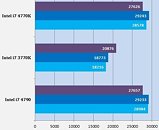Tuesday, May 6th 2014

Intel Core i7-4790 Incrementally Faster than i7-4770K: Review
TweakTown went ahead and posted the first formal review of Intel Core i7-4790, the fastest Core "Haswell" Refresh quad-core processor. Tested on an unnamed Z97 Express motherboard, with discrete graphics, the chip was found to be only incrementally faster than the i7-4770K, and just what you'd expect from a 100 MHz clock speed bump. The i7-4790 is clocked at 3.60 GHz, with a maximum Turbo Boost speed of 4.00 GHz, compared to the 3.50 GHz and 3.90 GHz clocks of the i7-4770K. It lacks an unlocked base-clock multiplier, and so its overclocking potential is severely limited, and close to non-existent; and so the i7-4790 is really a chip for those who want the best gaming performance, and don't intend to overclock their CPUs. Enthusiasts may want to hold out for "Devil's Canyon." Find the full review at the source.
Source:
TweakTown

58 Comments on Intel Core i7-4790 Incrementally Faster than i7-4770K: Review
Could really use them.
BTW 5.3ghz on the 3930K? Nice, thats an extreme overclock level.
Binned two CPUs to get this nice 3930K, I admit I was rather lucky. It still doesn't show degradation, it also keeps up with 2400 MHz on its IMC like a champ!
I like the mid range E chips, they are real power house chips with good clocking and a ton of power.
Xeon's are multiplier locked. You typically get between 300 and 900MHz from Turbo on a Xeon depending on number of cores involved, and that's it for the most part. You'll also pay handsomely for a Xeon that has a core count and clock speed in the same neighbourhood as an Extreme Edition i7. If you need a better runtime guarantee, maybe a larger cache, and ECC and/or high density memory support then a Xeon fits the bill, but a typical i7 EE user tends more toward overclocking + multi GPU. You can certainly use the i7 platform for workstation use, but the lower price trades off against the much reduced system memory limits- both in density and channels if you take the (LGA2011) Xeon's 2P operation into account.